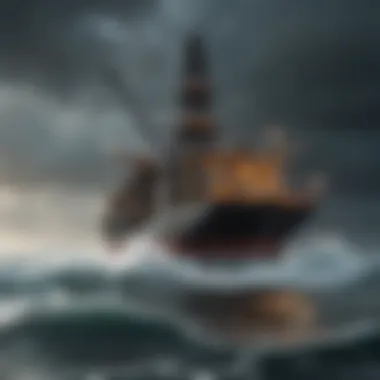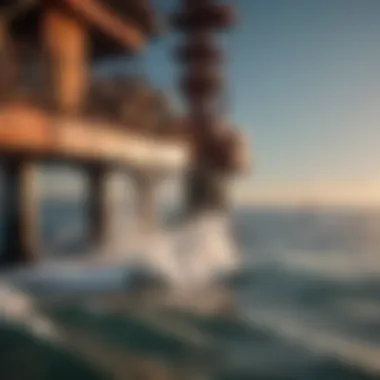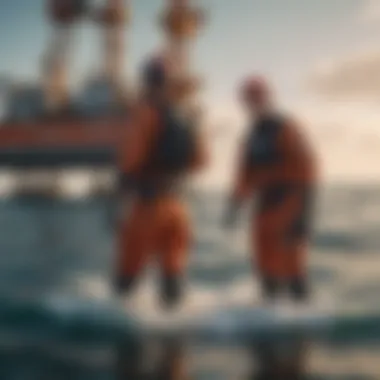Unlocking the Path to Offshore Drilling Success: A Comprehensive Guide


Water Activity Overview
Offshore drilling is a complex and challenging field that requires a deep understanding of marine environments and technical skills. It involves extracting oil and gas reserves from beneath the ocean floor, typically in deep waters. Professionals in this industry must be prepared to work in harsh conditions and adhere to strict safety protocols to ensure the success of drilling operations.
Tips and Techniques
Entering the realm of offshore drilling requires a strong foundation of knowledge and skills. For beginners, it is essential to start by gaining relevant qualifications in fields such as engineering, geology, or marine studies. Building practical experience through internships or entry-level positions can help individuals understand the intricacies of offshore drilling operations. Advanced techniques involve mastering specialized tools and equipment, as well as staying updated on industry trends and best practices. Safety guidelines play a critical role in offshore drilling to prevent accidents and protect both personnel and the environment.
Gear Reviews
Key gear in offshore drilling includes drilling rigs, blowout preventers, and various tools used for extraction and maintenance. Equipment reviews delve into the performance, reliability, and efficiency of gear such as drillships, semisubmersible platforms, and jack-up rigs. Understanding the technical specifications and operational capabilities of different types of gear is vital for professionals in the offshore drilling industry. Additionally, safety gear such as personal protective equipment (PPE) and emergency response kits are essential for mitigating risks in this high-stakes environment.
Destination Guides
Offshore drilling sites are located in various regions around the world, each offering unique challenges and opportunities. Popular locations for offshore drilling include the Gulf of Mexico, the North Sea, and the Persian Gulf. Hidden gems may exist in emerging markets with untapped oil and gas reserves, providing lucrative prospects for exploration companies. Travel tips for offshore drilling professionals revolve around logistics, cultural awareness, and safety precautions when working in remote or offshore locations. Understanding the geographical and environmental factors of different destinations is crucial for successful offshore drilling projects.
Understanding Offshore Drilling
Offshore drilling is a critical aspect of the oil and gas industry that involves extracting hydrocarbons from beneath the seabed. This section delves into the intricacies of offshore drilling, highlighting its significance in the energy sector and environmental considerations. Understanding offshore drilling is fundamental for professionals aiming to enter this field, as it provides insights into the specialized techniques and challenges associated with extracting resources from beneath the ocean floor.
What is Offshore Drilling?
Offshore drilling refers to the process of drilling for oil and gas deposits beneath the seabed. It involves the use of specialized drilling platforms and equipment to reach and extract hydrocarbons from beneath the ocean floor. This process is crucial for meeting the global demand for energy and plays a pivotal role in the production of oil and gas. Understanding the techniques and technologies involved in offshore drilling is essential for individuals interested in pursuing a career in this field.
Importance of Offshore Drilling
The importance of offshore drilling cannot be overstated in the realm of energy production. Offshore drilling accounts for a significant portion of the world's oil and gas supply, making it a cornerstone of the oil and gas industry. The exploration and extraction of resources from offshore locations contribute substantially to global energy security and economic growth. Moreover, offshore drilling enables access to untapped reserves that are vital for meeting the rising energy demands of modern society. Understanding the importance of offshore drilling is paramount for individuals looking to make a meaningful impact in the energy sector.
Challenges in Offshore Drilling


Despite its strategic significance, offshore drilling presents a myriad of challenges that necessitate careful consideration. Factors such as harsh weather conditions, complex geology, and environmental risks make offshore drilling a demanding endeavor. Additionally, ensuring safety standards, regulatory compliance, and environmental protection further intensify the challenges faced by offshore drilling operations. Understanding and effectively addressing these challenges are crucial for professionals seeking to excel in the field of offshore drilling.
Educational Background
To embark on a successful journey into the realm of offshore drilling, laying a sturdy educational foundation is paramount. The depth of knowledge and the mastery of technical skills required in this field necessitate a robust educational background. Acquiring relevant degrees, certifications, and continuing education not only advances one's expertise but also demonstrates a commitment to excellence and professionalism. Educational Background serves as the cornerstone for individuals aspiring to thrive in the dynamic and challenging domain of offshore drilling.
Relevant Degrees and Courses
Obtaining a degree in relevant disciplines such as Petroleum Engineering, Mechanical Engineering, or Geology is instrumental in preparing for a career in offshore drilling. These programs equip students with a profound understanding of the technical aspects of drilling operations, reservoir management, and safety protocols. Additionally, specialized courses focused on offshore drilling techniques, subsea systems, and drilling fluid dynamics provide invaluable insights into the complexities of working in offshore environments. Pursuing these degrees and courses not only enhances theoretical knowledge but also fosters practical skills essential for success in this field.
Certifications and Licenses
Securing industry-recognized certifications and licenses is crucial for validating proficiency and adherence to safety standards in offshore drilling. Certifications such as IWCF Well Control and BOSIET (Basic Offshore Safety Induction and Emergency Training) are essential requirements for many offshore positions, ensuring competence in critical areas such as well control and emergency response. Licenses from regulatory bodies like the Bureau of Safety and Environmental Enforcement (BSEE) are mandatory for overseeing operations in offshore facilities. Continued investment in acquiring and maintaining these certifications and licenses is imperative for career advancement and regulatory compliance.
Continuing Education
In the ever-evolving landscape of offshore drilling, prioritizing continuous learning through professional development programs and advanced courses is indispensable. Staying abreast of new technologies, safety regulations, and industry trends is essential for honing skills and enhancing expertise. Continuing education not only broadens knowledge horizons but also opens doors to advanced career opportunities and leadership roles within the offshore drilling sector. Embracing a mindset of lifelong learning and self-improvement is key to achieving sustained success in this demanding and competitive field.
Gaining Practical Experience
In the journey to embark on a career in offshore drilling, gaining practical experience stands out as a vital component. This section underscores the significance of hands-on experience in preparing individuals for the complex and challenging environment of offshore drilling. Practical experience offers a unique opportunity to apply theoretical knowledge in real-world scenarios, equipping aspiring professionals with the skills and confidence necessary to thrive in this dynamic field.
Internships and Apprenticeships
Internships and apprenticeships play a crucial role in bridging the gap between academic learning and practical application. By engaging in internships at offshore drilling companies or participating in apprenticeship programs, individuals can immerse themselves in the day-to-day operations of this industry. These opportunities provide invaluable exposure to the intricacies of offshore drilling, allowing interns and apprentices to learn from seasoned professionals, gain hands-on experience with equipment, and familiarize themselves with safety protocols.
Onshore Experience
Onshore experience serves as a solid foundation for aspiring offshore drilling professionals. Working in related industries such as onshore oil and gas operations or engineering projects offers individuals a chance to develop transferable skills that are highly relevant to offshore drilling. This experience provides a comprehensive understanding of drilling fundamentals, safety regulations, and technical aspects, laying a solid groundwork for a successful transition to offshore environments.
Transferable Skills


Transferable skills are essential assets that individuals can leverage from other industries to excel in offshore drilling. Communication, problem-solving, attention to detail, and teamwork are examples of transferable skills that are highly valued in the offshore drilling sector. These skills enable professionals to adapt to challenges, collaborate effectively with team members, and contribute to a safe and efficient working environment on offshore rigs.
Building Technical Skills
In the realm of offshore drilling, the prowess of technical skills stands as a pivotal asset for professionals aiming to prosper in this challenging domain. The ability to navigate through the intricacies of \
Networking and Job Search
Networking and job search play a pivotal role in the journey towards securing a career in offshore drilling. In this competitive industry, establishing connections and staying abreast of job opportunities are paramount for success. Networking provides avenues to interact with industry professionals, potential employers, and experts, fostering valuable relationships that can lead to collaborations and job prospects. Job search strategies help individuals identify suitable positions, apply for roles, and navigate the recruitment process effectively. By exploring networking and job search strategies, aspiring professionals can enhance their visibility, expand their knowledge of the industry, and increase their chances of securing fulfilling employment.
Industry Networking Events
Attending industry networking events is a strategic way to expand one's professional network and gain insights into the latest trends and developments in offshore drilling. These events bring together industry leaders, professionals, and enthusiasts, providing a platform to engage in discussions, share experiences, and forge valuable connections. Participation in conferences, seminars, workshops, and trade shows enables individuals to interact with key stakeholders, showcase their expertise, and explore potential career opportunities. Networking at industry events not only facilitates knowledge exchange but also serves as a stepping stone towards career advancement and personal growth.
Online Platforms and Job Boards
Online platforms and job boards have revolutionized the job search process, offering a convenient and efficient way to explore employment opportunities in offshore drilling. Websites dedicated to oil and gas industries, job portals, and professional networking sites allow individuals to browse through job listings, submit applications, and connect with recruiters with ease. These platforms provide a centralized hub for job seekers to access a wide range of job openings, from entry-level positions to senior roles. Leveraging online resources enhances visibility, broadens job search horizons, and streamlines the application process, empowering candidates to proactively pursue their career goals.
Building Professional Relationships
Building and nurturing professional relationships is a cornerstone of success in the field of offshore drilling. Cultivating connections with colleagues, industry peers, mentors, and supervisors fosters a supportive network that offers guidance, mentorship, and career advancement opportunities. Collaborating with professionals from diverse backgrounds and expertise enhances knowledge sharing, skill development, and industry insights. Building strong professional relationships not only enhances job satisfaction and performance but also paves the way for long-term career growth and success in the dynamic landscape of offshore drilling.
Preparing for Interviews
In the journey of delving into the intricacies of offshore drilling, one crucial aspect that demands meticulous attention is preparing for interviews. This pivotal step can be the gateway to a successful career in this challenging yet rewarding field. Understanding the dynamics of interviewing in the offshore drilling industry is imperative to leave a lasting impression on potential employers. Preparing for interviews involves a multifaceted approach - from researching the companies to mastering common interview questions and engaging in mock interviews, each facet contributing significantly to your preparedness. Hence, developing a strategic plan and honing your communication skills are paramount.
Researching Companies
Researching companies operating in the realm of offshore drilling is a critical element in preparing for interviews. Delving deep into the background, projects, values, and recent developments of potential employers not only showcases your genuine interest but also equips you with valuable insights. Understanding a company's ethos and goals allows you to align your aspirations with their objectives, demonstrating a strong sense of cultural fit. Moreover, researching companies empowers you to craft customized responses tailored to the specific needs and expectations of each prospective employer, setting you apart as a well-prepared and informed candidate.
Common Interview Questions


Navigating through common interview questions in the context of offshore drilling demands a comprehensive understanding of the industry. Anticipating and preparing for questions related to technical knowledge, safety protocols, problem-solving skills, and leadership abilities is vital. By familiarizing yourself with typical interview queries, you can articulate clear and concise responses, showcasing your expertise and suitability for roles in offshore drilling. Moreover, mastering common interview questions enables you to demonstrate your readiness to tackle the challenges and complexities inherent in this dynamic field, instilling confidence in potential employers.
Mock Interviews
Engaging in mock interviews simulates real-life interview scenarios, offering a valuable opportunity to practice and refine your communication skills. Conducting mock interviews enables you to receive constructive feedback, identify areas for improvement, and enhance your overall performance. By replicating the interview experience under simulated pressure, you can build confidence, enhance your ability to think on your feet, and adapt to different interview styles. Moreover, mock interviews provide a platform to fine-tune your responses, body language, and demeanor, ensuring that you present yourself authentically and effectively during actual interviews.
Landing Your First Job
In the journey to secure a position in offshore drilling, landing your first job stands as a pivotal milestone. As an aspirant navigating through this competitive industry, securing that initial role opens the gateway to a fulfilling career in offshore drilling. The significance of landing your first job extends beyond mere employment; it marks the beginning of practical application of the skills and knowledge accumulated through education and preparation. Providing a crucial foundation for future growth and development, this stage sets the tone for your progression in the field.
Entry-Level Positions
Entry-level positions in the realm of offshore drilling serve as the entry point for individuals seeking to kickstart their careers in this dynamic industry. These roles often require foundational knowledge and skills, offering newcomers the opportunity to gain hands-on experience while honing their expertise. Embracing an entry-level position provides invaluable exposure to the operational aspects of offshore drilling, fostering a deeper understanding of the industry's intricacies. By starting from the ground up, individuals can gradually familiarize themselves with the environment, protocols, and technologies that define offshore drilling operations.
Career Progression Paths
Navigating the career progression paths within offshore drilling demands strategic planning, continuous learning, and a proactive mindset. As professionals gain experience and broaden their skill set, various avenues for advancement reveal themselves. From roles with increased responsibilities to opportunities in specialized areas such as drilling engineering or rig management, the career pathways in offshore drilling are diverse and promising. Understanding the trajectory of career progression enables individuals to set long-term goals, enhance their competencies, and make informed decisions to propel their careers forward.
On-the-Job Learning
On-the-job learning serves as a cornerstone of professional development in offshore drilling. While formal education provides a solid theoretical foundation, hands-on experience significantly enriches one's understanding of the industry. Through on-the-job learning, individuals have the chance to apply theoretical knowledge in real-world scenarios, troubleshoot challenges, and refine their skills in a practical setting. This immersive learning process not only hones technical proficiencies but also cultivates critical thinking, problem-solving abilities, and situational awareness essential for success in offshore drilling.
Staying Updated and Advancing
Staying up to date with the latest advancements and continuously advancing one's skills are crucial components for success in the realm of offshore drilling. In this section, we delve into the significance of staying updated and advancing in the dynamically evolving field of offshore drilling. Understanding industry trends and innovations is paramount to remaining competitive and relevant. By staying abreast of emerging technologies, regulations, and best practices, professionals can enhance their proficiency and take on new challenges with confidence. Additionally, advancing one's skill set through ongoing education and professional development is key to opening up new opportunities for career growth and progression.
Professional Development
Professional development plays a pivotal role in shaping a successful career in offshore drilling. By actively engaging in training programs, workshops, and courses, individuals can expand their knowledge base, hone their expertise, and stay ahead of the curve in this competitive industry. Continuous learning not only allows professionals to adapt to changing demands but also equips them with the tools needed to address complex drilling projects with efficiency and precision. Seeking out mentorship from seasoned industry veterans can provide invaluable insights and guidance, further contributing to one's professional development journey.
Industry Trends and Innovations
Keeping abreast of industry trends and innovations is vital for professionals in the offshore drilling sector. By monitoring market dynamics, technological advancements, and industry shifts, individuals can anticipate changes and position themselves advantageously within the industry. Embracing innovation and staying proactive in adopting new technologies enable professionals to optimize drilling processes, improve safety standards, and enhance operational efficiency. By staying informed about the latest trends, professionals can align their skills and expertise with the evolving needs of the industry.
Mentorship and Guidance
Mentorship and guidance play a crucial role in nurturing talent and fostering career development in offshore drilling. Experienced mentors can provide valuable advice, practical insights, and career guidance to aspiring professionals looking to navigate the intricacies of the sector. By seeking mentorship from seasoned experts, individuals can gain a broader perspective, access valuable networking opportunities, and accelerate their professional growth. Establishing mentor-mentee relationships can offer a supportive environment for learning, skill development, and career progression in the competitive landscape of offshore drilling.















